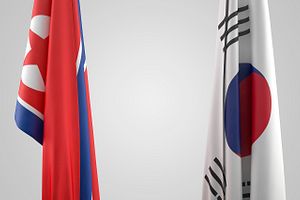A North Korean defector in her 40s was found dead with her 6-year-old son in South Korea. Police are investigating the possibility that the two starved to death, noting that there was no food at home at the time of the discovery.
According to the police, the water inspector visited the defector’s house after he had not heard from her upon a request for unpaid bills. The inspector noticed a bad smell coming from the house and reported it to the building manager. The manager forcibly opened the window and found the dead bodies.
A police official said, “Given the testimony of people around the apartment, including residents, they are presumed to have died about two months ago.” He added, “There has been no confirmation of murder or suspicion of committing suicide.”
The police asked South Korea’s National Institute of Scientific Investigation to conduct an autopsy to determine the exact cause of death. But given the suspicion that she and her son died out of hunger, the tragedy has raised accusations that the government could have prevented it. After all, all defectors are subject to government protection upon arrival in South Korea.
North Korean defectors who have settled in South Korea receive a 12-week basic education for adjusting to South Korean society at an institution called Hanawon, which is affiliated with the Unification Ministry. After completing that education, defectors will then receive an additional eight days of care at local Hanawon centers in their respective regions.
After that, the local government, police, and the Ministry of Employment and Labor will help provide for North Korean defectors’ residences, employment, and safety. Under the current law, the protection period for North Korean refugees is five years.
In this particular case, the government and police said they could not contact the deceased woman because the protection period was over. The woman had settled in South Korea in 2009. Officials also claimed that she did not welcome being contacted by the authorities.
Still, North Korean defector groups have said that the government is ultimately responsible for causing the death of the woman and her son, as it has “mistreated” defectors over the past few years.
Yong Hwa, head of the North Korean Refugees and Human Rights Alliance, said, “I’ve never heard of a local government coming [to a] home to give aid such as a counseling service to North Korean defectors… The defectors are living a marginalized life in South Korea.”
In fact, since the Moon administration took office, there have been similar concerns over the government’s discriminatory attitude toward North Korean defectors.
In May, the North Korea Freedom Coalition and the American Enterprise Institute hosted “North Korea Freedom Week,” inviting North Korean defectors to Washington, D.C. for a discussion.
At that time, Heo Gwang-il, head of the Committee for Democratization of North Korea, said all support for North Korean defector groups had been halted since Moon Jae-in became president. He also mentioned a rumor that the government was checking the backgrounds of defectors to cherry-pick whom to support.
Another participant in the forum, Kim Heung-kwang, founder and director of North Korea Intellectuals Solidarity, said the government is gradually cracking down on defectors in South Korea, especially those who are vocal about human rights issues in the North.
Kim claimed that he has lost opportunities giving lectures at universities, public speeches, and appearing on TV shows as a North Korean expert under the new government.
Head of Fighters For Free North Korea Park Sang-hak also said the government had asked the organization to refrain from activities to promote human rights in the North, such as sending leaflets.
The three figures mentioned above have been actively promoting human rights issue in North Korea and are widely respected defectors in South Korea. Their comments indicate that concerns over the government’s attitude toward defectors are far from groundless.
Returning to the case of the defector woman and her son, South Korea’s Unification Ministry said it will review the support management system for North Korean defectors. The ministry will try to come up with necessary measures as soon as the results of the police investigation are released, officials said.
The ministry also said that the government will try to ensure there is no blind spot for North Korean defectors.
The experience and process of North Korean defectors assimilating into the South Korean society could be considered a rehearsal for reunification. After all, it is North Korean defectors who can serve as a bridge to connect the South and the North after reunification. That makes it especially ironic to see the South Korean president and the government talking about reunification even as defectors within South Korea struggle.

































